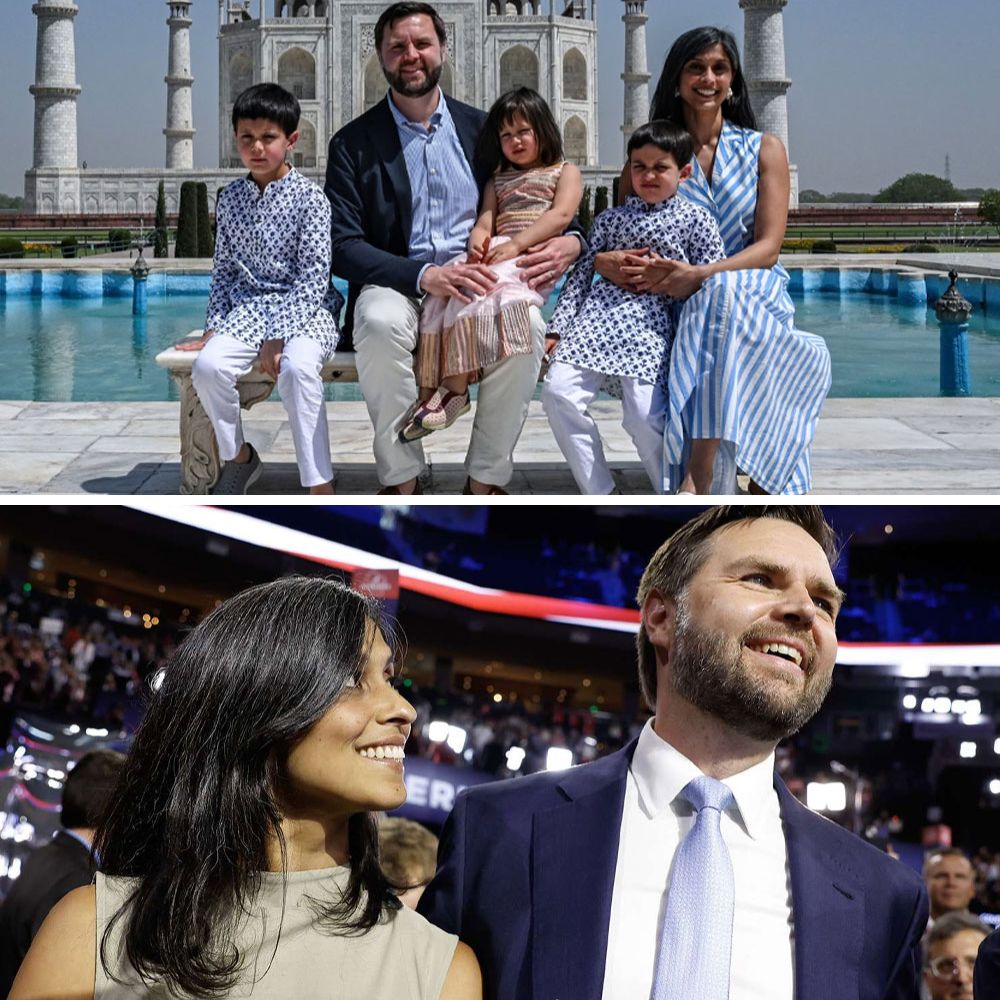Long before the cameras and campaign trails, they were strangers at Yale Law — two souls from opposite worlds. She had a future that pointed to the Supreme Court. He had a past that haunted him. Love brought them together. Politics would test everything. And somewhere between ambition and loyalty lies a story you won’t believe until you read it.

In the polished halls of Yale Law School, where ambition and intellect often define the room, two students crossed paths whose worlds could not have been more different. J.D. Vance, a Marine veteran from Middletown, Ohio, was a first-generation law student still finding his footing among Ivy League peers. Usha Chilukuri, the daughter of Indian immigrants and a rising star with an impeccable academic record, seemed destined for the nation’s top legal circles. Yet, against the odds of background and culture, their meeting sparked a partnership that would come to define not only their personal lives but also their public identities.
Vance would later write in Hillbilly Elegy about feeling out of place at Yale — a man from a working-class background suddenly thrust into an elite world. It was there, amid long nights of case studies and campus debates, that Usha became both his confidante and his compass. They worked together on a discussion group that explored issues of poverty and social decline — themes central to his own upbringing. Their friendship grew quietly, rooted in respect before it turned romantic. “She believed in me when I barely believed in myself,” Vance once said of her influence during those formative years.
By the time they graduated, their relationship had deepened into a bond that transcended differences in faith, culture, and upbringing. In June 2014, they married in a ceremony that reflected both of their worlds — a blend of Christian and Hindu traditions. To Vance, who was raised Protestant and later converted to Catholicism, and Usha, who remained deeply connected to her Indian heritage, the union symbolized something larger: the merging of two Americas, two traditions, and two visions of success.
Usha’s career trajectory, by all accounts, could have gone anywhere. After Yale, she clerked for Supreme Court Chief Justice John Roberts — one of the most prestigious legal positions in the United States. Her reputation as brilliant, disciplined, and measured quickly followed her. Yet, as Vance’s memoir catapulted him into national fame and eventually into politics, Usha made a decision that many have described as an act of quiet sacrifice. She stepped back from the high-octane world of appellate law to anchor their growing family, providing stability amid her husband’s turbulent public rise.
The couple, now parents to three children, have built a life that balances public scrutiny with private conviction. Friends describe Usha as calm and deliberate — a grounding force against Vance’s intensity. “She’s the steady one,” a Yale classmate told Business Insider. “J.D. may have the louder voice, but she’s the quiet architect behind their life.” Those who have followed Vance’s career often note how he credits her for much of his success, from early writing days to his Senate campaign and, more recently, his national political spotlight.
That spotlight, however, has not been kind. As Vance’s profile grew, so did attacks on Usha’s heritage. Online trolls and extremist voices fixated on her Indian background, questioning her faith and her place beside a populist conservative candidate. The vitriol reached a peak after Vance’s nomination for vice president, when white nationalist groups began circulating racist memes and slurs about her and their children.
Vance, usually measured in tone, responded with unmistakable emotion. In an interview, he condemned the attacks as “cowardly and disgusting,” adding, “I love my wife. She’s beautiful, she’s brilliant, and she’s far out of your league.” His words went viral, a rare moment of raw humanity in a political landscape often defined by calculation. Supporters hailed it as a powerful defense not only of his wife but of interracial families everywhere who still face prejudice in modern America.
Behind the scenes, Usha has continued to navigate her role with grace — part private mother, part public figure. She has appeared beside her husband at campaign events, often understated yet poised, a quiet contrast to the often-chaotic energy of politics. Insiders note that she remains his closest adviser, helping to shape his tone and priorities, though she avoids the limelight whenever possible.
Their marriage, a blend of personal devotion and public purpose, has become emblematic of a larger American story — one about class mobility, cultural intersection, and the compromises of ambition. For Vance, who built his name on the struggle to rise from hardship, Usha represents both his anchor and his aspiration. For her, love meant walking alongside him into a world of relentless scrutiny, often trading personal dreams for shared ones.
In the end, theirs is not a fairy-tale romance so much as a testament to endurance — two people from different worlds finding a middle ground between faith and ambition, tradition and modernity. And while politics may define how the world sees them, those who know them insist that their bond, forged in the quiet corners of Yale and tested on the public stage, remains deeply personal — built, as Vance once said, “on trust, on belief, and on love that refuses to bend.”